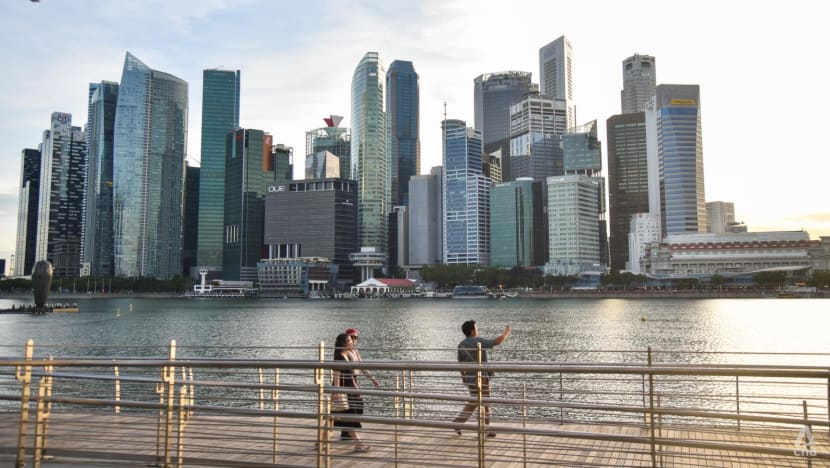Singapore’s core inflation at 0.3% in August, lowest in more than 4 years

The Singapore skyline. (File photo: CNA/Syamil Sapari)

This audio is generated by an AI tool.
SINGAPORE: Singapore’s core inflation eased to 0.3 per cent year-on-year in August from 0.5 per cent the month before, official data showed on Tuesday (Sep 23).
This was mainly driven by a moderation in services inflation, the Monetary Authority of Singapore (MAS) and Ministry of Trade and Industry (MTI) said in a joint press release.
The key consumer price gauge was the lowest since February 2021, when it was 0.2 per cent.
The figure, which excludes private road transport and accommodation costs, was also lower than the median forecast of 0.5 per cent in a Reuters poll of economists.
On a month-on-month basis, core prices grew by 0.1 per cent in August.
Overall inflation, as measured by the Consumer Price Index-All Items (CPI-All Items), eased to 0.5 per cent in August from 0.6 per cent in July, reflecting lower accommodation inflation and a fall in core inflation.
On a month-on-month basis, CPI-All items inflation – which excludes non-consumption spending such as purchases of houses, shares and other financial assets and income taxes – rose by 0.5 per cent in August.
The Consumer Price Index is commonly used in Singapore as a measure of consumer price changes in the economy.
It tracks the change in prices of a fixed basket of consumption goods and services commonly bought by the general resident households over time.
The CPI-All Items provides a comprehensive overview of the prices of consumer goods and services.
SECTORS
In August, services inflation slowed to 0.4 per cent from 0.7 per cent the month before, amid a steeper decline in the costs of holiday expenses, airfares and inpatient services.
Accommodation inflation eased slightly to 0.4 per cent, due to a smaller increase in housing rents, while food inflation was unchanged at 1.1 per cent as a slight moderation in non-cooked food inflation was offset by a mild pickup in food services inflation, MAS and MTI said.
Electricity and gas inflation edged down to -5.7 per cent from -5.6 per cent in July. The cost of electricity and gas fell at a slightly quicker pace because of a larger decline in electricity prices, said MAS and MTI.
Private transport inflation rose to 2.4 per cent from 2.1 per cent in July on account of a larger increase in car prices, as well as a smaller decline in petrol prices.
Inflation of retail and other goods, which came in at -0.2 per cent in August, fell at a slower pace as the price of clothing and footwear rose, while that of telecommunication equipment registered a smaller decline.
OUTLOOK
MAS and MTI said that Singapore's imported inflation should remain moderate in the near term.
They noted that global crude oil prices remain below year-ago levels, and "food commodity price increased should also stay contained".
"Although the ongoing trade conflicts could be inflationary for some economies, their impact on Singapore’s import prices is likely to be offset by the disinflationary drags exerted by weaker global demand," they added.
Domestically, slower nominal wage growth and continuing increases in labour productivity should contribute to a moderation in unit labour costs. Enhanced government subsidies for essential services will also continue to dampen services inflation, said MAS and MTI.
MAS and MTI kept their projection for both core and overall inflation at an average between 0.5 and 1.5 per cent in 2025.
However, the inflation outlook in the quarters ahead is subject to both upside and downside risks.
"Geopolitical shocks could lift imported energy and shipping costs abruptly.
"Conversely, should global and domestic growth be more hesitant and weaker than anticipated, core inflation could stay low for longer," they said.
















